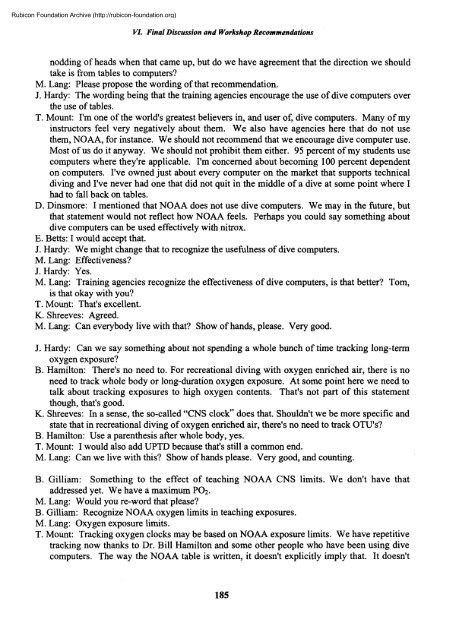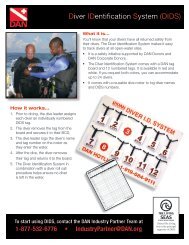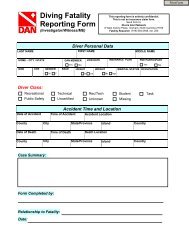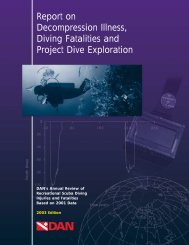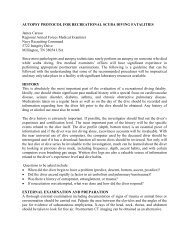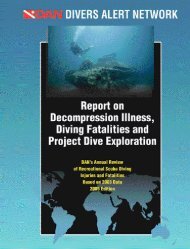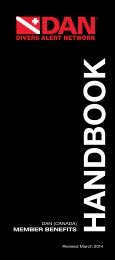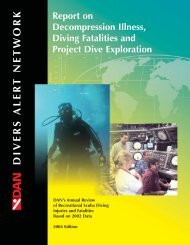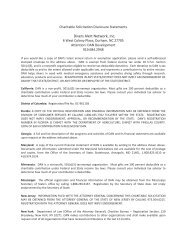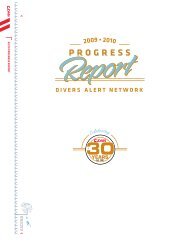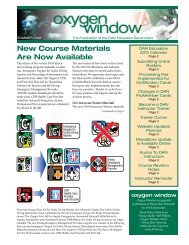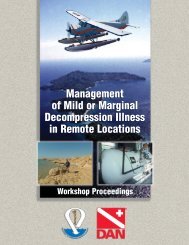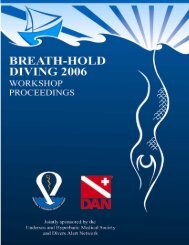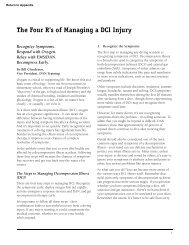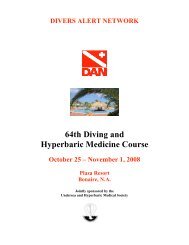Nitrox workshop dings - Divers Alert Network
Nitrox workshop dings - Divers Alert Network
Nitrox workshop dings - Divers Alert Network
You also want an ePaper? Increase the reach of your titles
YUMPU automatically turns print PDFs into web optimized ePapers that Google loves.
Rubicon Foundation Archive (http://rubicon-foundation.org)VI. Final Discussion and Workshop Recommendationsnodding of heads when that came up, but do we have agreement that the direction we shouldtake is from tables to computers?M. Lang: Please propose the wording of that recommendation.J. Hardy: The wording being that the training agencies encourage the use of dive computers overthe use of tables.T. Mount: I'm one of the world's greatest believers in, and user of, dive computers. Many of myinstructors feel very negatively about them. We also have agencies here that do not usethem, NO A A, for instance. We should not recommend that we encourage dive computer use.Most of us do it anyway. We should not prohibit them either. 95 percent of my students usecomputers where they're applicable. I'm concerned about becoming 100 percent dependenton computers. I've owned just about every computer on the market that supports technicaldiving and I've never had one that did not quit in the middle of a dive at some point where Ihad to fall back on tables.D. Dinsmore: I mentioned that NOAA does not use dive computers. We may in the future, butthat statement would not reflect how NOAA feels. Perhaps you could say something aboutdive computers can be used effectively with nitrox.E. Betts: I would accept that.J. Hardy: We might change that to recognize the usefulness of dive computers.M. Lang: Effectiveness?J. Hardy: Yes.M. Lang: Training agencies recognize the effectiveness of dive computers, is that better? Tom,is that okay with you?T. Mount: That's excellent.K. Shreeves: Agreed.M.Lang: Can everybody live with that? Show of hands, please. Very good.J. Hardy: Can we say something about not spending a whole bunch of time tracking long-termoxygen exposure?B. Hamilton: There's no need to. For recreational diving with oxygen enriched air, there is noneed to track whole body or long-duration oxygen exposure. At some point here we need totalk about tracking exposures to high oxygen contents. That's not part of this statementthough, that's good.K. Shreeves: In a sense, the so-called "CNS clock" does that. Shouldn't we be more specific andstate that in recreational diving of oxygen enriched air, there's no need to track OTU's?B. Hamilton: Use a parenthesis after whole body, yes.T. Mount: I would also add UPTD because that's still a common end.M. Lang: Can we live with this? Show of hands please. Very good, and counting.B. Gilliam: Something to the effect of teaching NOAA CNS limits. We don't have thataddressed yet. We have a maximum PO2.M. Lang: Would you re-word that please?B. Gilliam: Recognize NOAA oxygen limits in teaching exposures.M. Lang: Oxygen exposure limits.T. Mount: Tracking oxygen clocks may be based on NOAA exposure limits. We have repetitivetracking now thanks to Dr. Bill Hamilton and some other people who have been using divecomputers. The way the NOAA table is written, it doesn't explicitly imply that. It doesn't185


